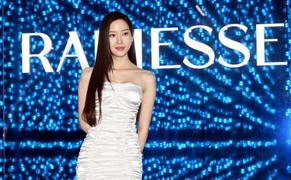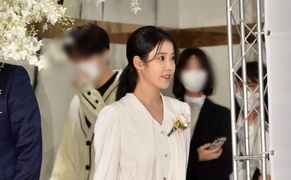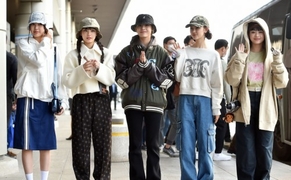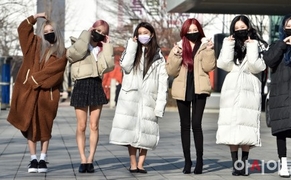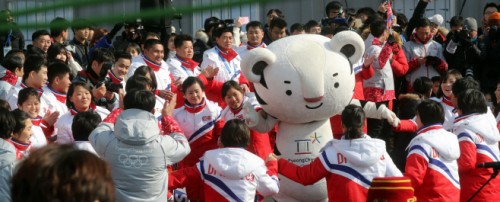 |
| North Korean athletes dance with Soohorang, the official mascot of the 2018 Winter Olympics, at the welcome ceremony in the Gangneung athletes' village on Feb. 8./ Source: Yonhap News |
By AsiaToday reporter Heo Go-woon
The world's biggest winter festival in 2018 has begun on Thursday. Given that the 2018 PyeongChang Winter Olympic Games restored inter-Korean dialogue that has been cut off for years and created the first-ever joint North and South Korean women's ice hockey team, it is expected to become the one that best shows peace, the fundamental spirit of the Olympics.
The PyeongChang Olympic Games will commence on Thursday, February 8 and run until Sunday, February 25, while the opening ceremony will take place in the PyeongChang Olympic Stadium on Friday, February 9. The highlight of the ceremony is the joint march of the South and North Korean athletes under a single "unification flag" to the tune of "Arirang". It will be a symbolic moment to show that the volatile situation on the Korean Peninsula has resolved following a year of North Korean nuclear provocations and intensified sanctions against the North that triggered fears of war on the Korean Peninsula. The last joint march of the Koreas was at the Asian Winter Games in Changchun, China, in 2007.
The opening ceremony will be attended by Japanese Prime Minister Shinzo Abe, US Vice President Mike Pence, China's Politburo Standing Committee member Han Zheng, and other world leaders. Kim Yo-jong, sister of North Korean leader Kim Jong-un and first vice-director of the Central Committee within the ruling Workers' Party, will be attending the ceremony as one of North Korean high-ranking delegates.
As the first member of North Korea's ruling family to set foot in South Korea, Kim Yo-jong is likely to meet South Korean President Moon Jae-in at the Blue House on February 10 along with the rest of North Korea's high-ranking delegation, including Kim Young-nam, the North's ceremonial head of state. During the meeting, Ms. Kim is expected to deliver a letter or message from her brother to Moon. In response, the Blue House is likely to dispatch a special envoy to North Korea hoping to hold an inter-Korean summit within the year.
The attendance of US Vice President Mike Pence, who called North Korea a 'rogue regime', and Japanese Prime Minister Shinzo Abe, who is actively engaged in sanctions against the North, might bring conflict with the North. However, this could give President Moon an opportunity to take the driver's seat on inter-Korean affairs by playing a mediating role and bringing North Korea-U.S. dialogue as well as peace on the Korean Peninsula.
The North Korean cheering squad, who visited the South in 13 years, is also a noteworthy part of the Games. The 229-member squad will support not only North Koreans and the joint Korean women's ice hockey team but also some South Korean athletes.
The PyeongChang Olympic Games will not be just an international sports event. It will be a place where South Korea brings peace on the Korean Peninsula after it united the global village that was divided by the Cold War between East and West through the 1988 Seoul Olympic 30 years ago.
The PyeongChang Olympic Games will not be just an international sports event. It will be a place where South Korea brings peace on the Korean Peninsula after it united the global village that was divided by the Cold War between East and West through the 1988 Seoul Olympic 30 years ago.
By the end of last year, some countries had hesitated to participate in the Olympics raising safety concerns amid heightened nuclear tensions on the Korean Peninsula. However, the inter-Korean dialogue has been restored and the joint military exercises between South Korea and the United States have been postponed until after the Olympics, keeping the atmosphere peaceful and dispelling such concerns.
The international community has high hopes for the establishment of a peaceful atmosphere on the Korean Peninsula, triggered by the Olympics. Pope Francis sent a blessing to athletes and organizers of the PyeongChang Olympics at the end of his weekly Wednesday general audience. He said the traditional Olympic truce "takes on special importance this year" with the decision by the two Koreas, which will compete together in an united team and march together under an unification flag at the opening ceremony.
The government plans to further enhance peace momentum through the successful hosting of the Games and continue dialogue and exchanges after the Olympics with its ultimate goal of denuclearizing North Korea.
#PyeongChang #Winter Olympics #Peace Olympics
Copyright by Asiatoday
Most Read
-
1
-
2
-
3
-
4
-
5
-
6
-
7

















